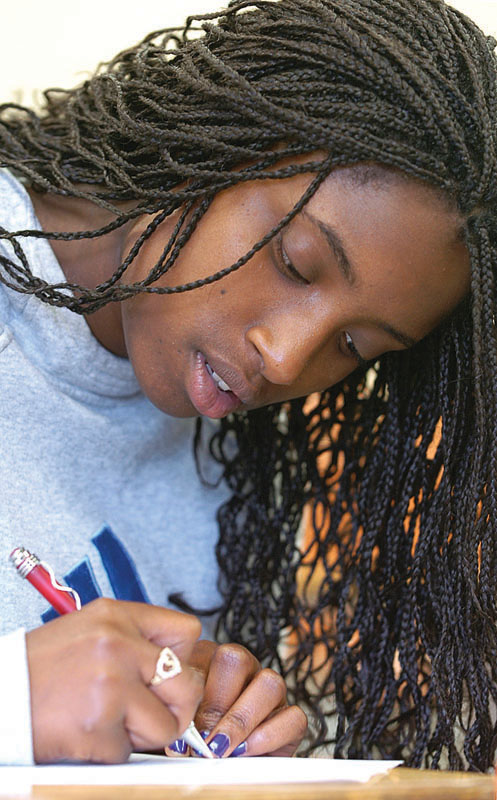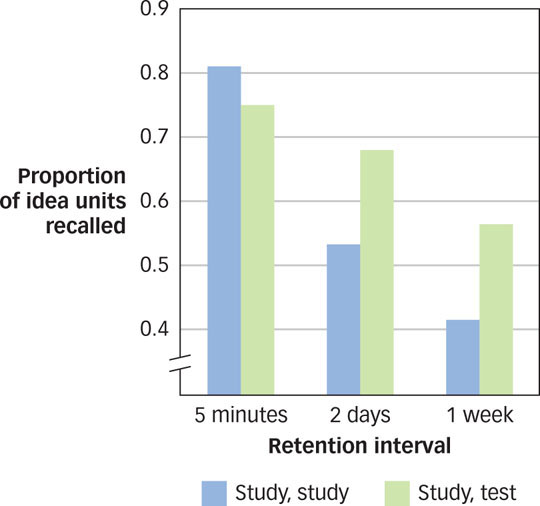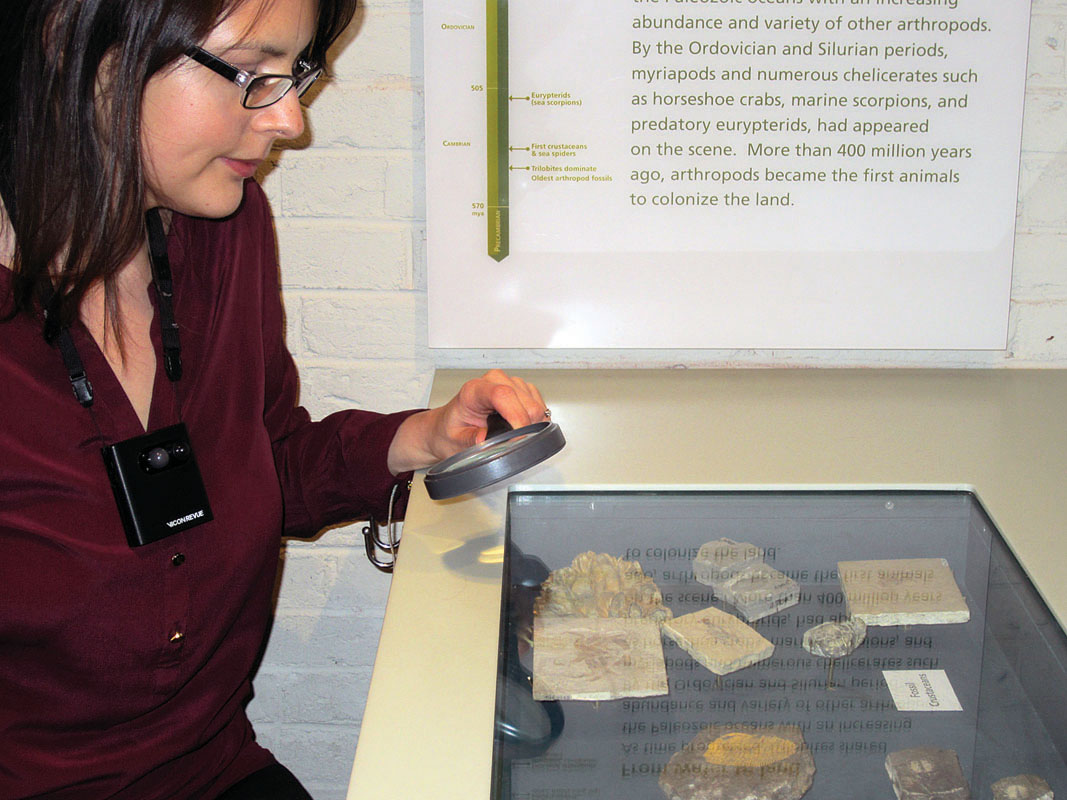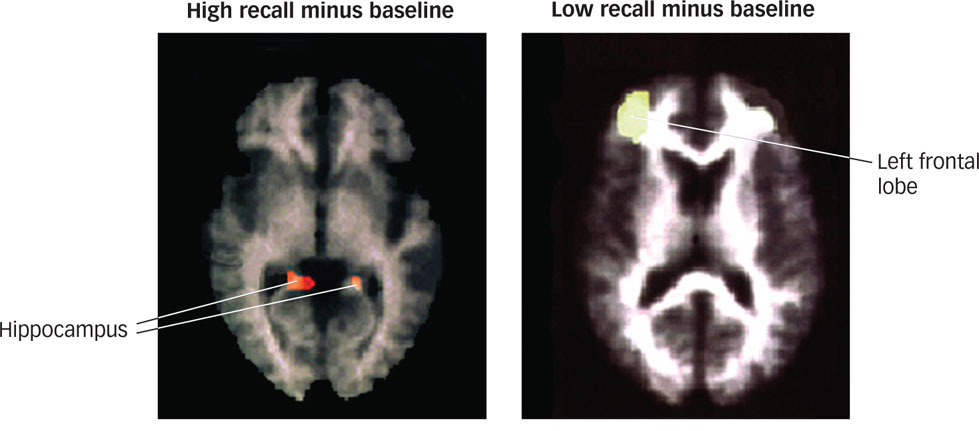6.3 Retrieval: Bringing Memories to Mind
There is something fiendishly frustrating about piggy banks. You can put money in them, you can shake them around to assure yourself that the money is there, but you can’t easily get the money out. If memories were like pennies in a piggy bank, stored but inaccessible, what would be the point of saving them in the first place? Retrieval is the process of bringing to mind information that has been previously encoded and stored, and it is perhaps the most important of all memory processes (Roediger, 2000; Schacter, 2001a).
Retrieval Cues: Reinstating the Past
One of the best ways to retrieve information from inside your head is to encounter information outside your head that is somehow connected to it. The information outside your head is called a retrieval cue, external information that is associated with stored information and helps bring it to mind. Retrieval cues can be incredibly effective. How many times have you said something like, “I know who starred in Trouble with the Curve, but I just can’t remember her name?”, only to have a friend give you a hint (“Wasn’t she in Julie & Julia?”), which instantly brings the answer to mind (“Amy Adams!”).

In one experiment, undergraduates studied lists of words, such as table, peach, bed, apple, chair, grape, and desk (Tulving & Pearlstone, 1966). Later, the students were asked to write down all the words from the list that they could remember. When they were absolutely sure that they had emptied their memory stores of every last word that was in them, the experimenters again asked the students to remember the words on the list, but this time, the experimenters provided retrieval cues, such as “furniture” or “fruit.” The students who were sure that they had done all the remembering they possibly could were suddenly able to remember more words. These results suggest that information is sometimes available in memory even when it is momentarily inaccessible, and that retrieval cues help us bring inaccessible information to mind.
What is an example of a retrieval cue you have used?
Hints are one kind of retrieval cue, but they are not the only kind. The encoding specificity principle states that a retrieval cue can serve as an effective reminder when it helps re-
237
Retrieval cues need not be external contexts–they can also be inner states. State-dependent retrieval is the tendency for information to be better recalled when the person is in the same state during encoding and retrieval. For example, retrieving information when you are in a sad or happy mood increases the likelihood that you will retrieve sad or happy episodes (Eich, 1995), which is part of the reason it is so hard to “look on the bright side” when you’re feeling low. Similarly, you’d probably expect a fellow student who studied for an exam while drunk to perform poorly, and you would probably be right–but only if he made the mistake of taking the exam while sober! Studies of state-
The encoding specificity principle makes some unusual predictions. For example, you learned earlier that making semantic judgments about a word (e.g., What does brain mean?) usually produces more durable memory for the word than does making rhyme judgments (e.g., What rhymes with brain?). So if you were shown a cue card of the word “brain,” and your friend was asked to think about what brain means while you were asked to think of a word that rhymes with brain, we would expect your friend to remember the word better the next day if we simply asked you both, “Hey, what was that word you saw yesterday?” However, if instead of asking that question, we asked you both, “What was that word that rhymed with train?” the retrieval cue would match your encoding context better than your friend’s, and we would expect you to remember it better than your friend did (Fisher & Craik, 1977). This is a fairly astounding finding. The principle of transfer-appropriate processing is the idea that memory is likely to transfer from one situation to another when the encoding and retrieval contexts of the situations match (Morris, Bransford, & Franks, 1977; Roediger, Weldon, & Challis, 1989).
Consequences of Retrieval
Human memory differs substantially from computer memory. Simply retrieving a file from my computer doesn’t have any effect on the likelihood that the file will open again in the future. Not so with human memory. Retrieval doesn’t merely provide a readout of what is in memory, it also changes the state of the memory system in important ways.
Retrieval Can Improve Subsequent Memory

 Figure 6.9: Memory Testing Benefits Long-
Figure 6.9: Memory Testing Benefits Long-Should students spend more time testing themselves on material (retrieval), or studying it over and over?
Psychologists have known for some time that the act of retrieval can strengthen a retrieved memory, making it easier to remember that information at a later time (Bjork, 1975). Does this finding surprise you? Probably not. Repeating an item usually improves memory for that item, so the act of retrieval might boost subsequent memory simply because the information is repeated, resulting in the same benefit you would receive from studying the information twice instead of once. Makes sense, right? Wrong. It turns out that retrieving information from memory has different effects than studying it again. This point was made dramatically in an experiment where participants studied brief stories and then either studied them again or were given a test that required retrieving the stories (Roediger & Karpicke, 2006). Participants were then given a final recall test for the stories either 5 minutes, 2 days, or 1 week later. As shown in FIGURE 6.9, at the 5-
238
Retrieval Can Impair Subsequent Memory
As much as retrieval can help memory, that’s not always the case. Retrieval-induced forgetting is a process by which retrieving an item from long-
Let’s see how a typical experiment on retrieval-
How can retrieval-
Can you think of any examples of how retrieval-
239
Retrieval Can Change Subsequent Memory

In addition to improving and impairing subsequent memory, the act of retrieval can also change what we remember from an experience. Consider a recent experiment in which participants went on a tour of a museum, where they took some time to view designated exhibits, each of which contained several different stops (St. Jacques & Schacter, in press). The participants took the tour while wearing a camera that, every 15 seconds, automatically took pictures of what was in from of them. Two days later, participants visited the memory laboratory (in a separate building) for a “reactivation session.” After memories of some of the stops were reactivated by looking at photos of them, participants were asked to rate, on a 1–5 scale, how vividly they reexperienced what had happened at each stop. Next, the participants were shown novel photos of unvisited stops within the exhibit, then were asked to judge how closely these novel photos were related to the photos of the stops that they had actually seen in that exhibit. Finally, the participants were given a memory test 2 days after the reactivation session.
Participants sometimes incorrectly remembered that the stop shown in the novel photo had been part of the original tour. Most importantly, participants who tended to make this mistake also tended to have more vivid recollections during the reactivation session. In other words, retrieving and vividly reexperiencing memories of what participants actually did see at the museum led them to incorporate into their memory information that was not part of their original experience. This finding may be related to the phenomenon of reconsolidation that we discussed earlier (p.234), where reactivating a memory temporarily makes it vulnerable to disruption and change. At the very least, this finding reinforces the idea that retrieving a memory involves far more than a simple readout of information.
Separating the Components of Retrieval
How is brain activity different when trying to recall versus successfully recalling?
Before leaving the topic of retrieval, let’s look at how the process actually works. There is reason to believe that trying to recall an incident and successfully recalling one are fundamentally different processes that occur in different parts of the brain (Moscovitch, 1994; Schacter, 1996). For example, regions in the left frontal lobe show heightened activity when people try to retrieve information that was presented to them earlier (Oztekin, Curtis, & McElree, 2009; Tulving et al., 1994). This activity may reflect the mental effort of struggling to dredge up the past event (Lepage et al., 2000). However, successfully remembering a past experience tends to be accompanied by activity in the hippocampal region (see FIGURE 6.10; Eldridge et al., 2000; Giovanello, Schnyer, & Verfaellie, 2004; Schacter, Alpert, et al., 1996). Furthermore, successful recall also activates parts of the brain that play a role in processing the sensory features of an experience. For instance, recall of previously heard sounds is accompanied by activity in the auditory cortex (the upper part of the temporal lobe), whereas recall of previously seen pictures is accompanied by activity in the visual cortex (in the occipital lobe; Wheeler, Petersen, & Buckner, 2000). Although retrieval may seem like a single process, brain studies suggest that separately identifiable processes are at work.

 Figure 6.10: PET Scans of Successful and Unsuccessful Recall When people successfully remembered words they saw earlier in an experiment (achieving high levels of recall on a test), the hippocampus showed increased activity. When people tried but failed to recall words they had seen earlier (achieving low levels of recall on a test), the left frontal lobe showed increased activity (Schacter, Alpert, et al., 1996).
Figure 6.10: PET Scans of Successful and Unsuccessful Recall When people successfully remembered words they saw earlier in an experiment (achieving high levels of recall on a test), the hippocampus showed increased activity. When people tried but failed to recall words they had seen earlier (achieving low levels of recall on a test), the left frontal lobe showed increased activity (Schacter, Alpert, et al., 1996).
240
This sheds some light on the phenomena we just discussed: retrieval-
CULTURE & COMMUNITY: Does culture affect childhood amnesia?
You can easily recall many experiences from different times in your life. But you probably have few or no memories from the first few years of your life, which is called childhood amnesia or infantile amnesia. On average, an individual’s first memory dates to about 3 to 3½ years of age (Dudycha & Dudycha, 1933; Waldfogel, 1948), with women reporting slightly earlier first memories (3.07 years of age) than men (3.4 years) (Howes, Siegel, & Brown, 1993). But these estimates are based on individuals from Western (i.e., North American and European) cultures, which emphasize talking about the past. First memories are seen at later ages in Asian cultures that place less emphasis on talking about the past, such as Korea and China (MacDonald, Uesiliana, & Hayne, 2000; Mullen, 1994; Peterson, Wang, & Hou, 2009). A comparison of Canadian and Chinese children showed that first memories of 8-

241
 Whether we remember a past experience depends on whether retrieval cues are available to trigger recall. Retrieval cues are effective when they are given in the same context as when we encoded an experience. Moods and inner states can serve as retrieval cues.
Whether we remember a past experience depends on whether retrieval cues are available to trigger recall. Retrieval cues are effective when they are given in the same context as when we encoded an experience. Moods and inner states can serve as retrieval cues. Retrieving information from memory has consequences for later remembering. Retrieval improves subsequent memory of the retrieved information, as exemplified by the beneficial effect of testing on later recall. However, retrieval can impair subsequent remembering of related information that is not retrieved. It can also change subsequent remembering when novel information is associated with vivid recollections.
Retrieving information from memory has consequences for later remembering. Retrieval improves subsequent memory of the retrieved information, as exemplified by the beneficial effect of testing on later recall. However, retrieval can impair subsequent remembering of related information that is not retrieved. It can also change subsequent remembering when novel information is associated with vivid recollections. Retrieval can be separated into the effort we make while trying to remember what happened in the past and the successful recovery of stored information. Neuroimaging studies suggest that trying to remember activates the left frontal lobe, whereas successful recovery of stored information activates the hippocampus and regions in the brain related to sensory aspects of an experience.
Retrieval can be separated into the effort we make while trying to remember what happened in the past and the successful recovery of stored information. Neuroimaging studies suggest that trying to remember activates the left frontal lobe, whereas successful recovery of stored information activates the hippocampus and regions in the brain related to sensory aspects of an experience.